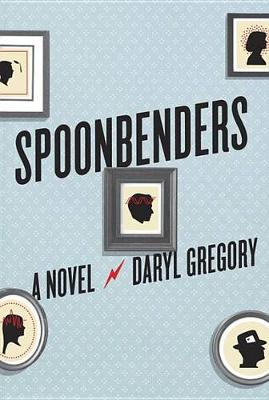Reviewed by Quirky Cat on
It took me a little while to settle into Spoonbenders, and I don’t mean that in a negative way, Daryl Gregory just has a writing style that leads to a natural buildup of the plot and character development. All the little details made the world and events feel that much more real and believable.
Spoonbenders follows the life and adventures of the Telemachus family, all of whom are gifted in one way or another. But not gifted in the normal sense. They’re all psychic. Each family member has their own distinct ability, with only a couple exceptions (which become obvious as you read the book).
I have to say that I was really surprised by the complexity of this novel; and how well written it was. Everything flowed naturally, and the characters were interesting, if sometimes aggravating (but isn’t that always the way with family?).
Teddy Telemachus was simultaneously my favorite and least favorite character. While he acts as a psychic, he’s actually just a con-man. I cannot even begin to describe just how funny I found that to be. He ends up marrying a true psychic, whom their children inherit abilities from. Teddy’s long term plot was probably the best for its humor value if nothing else. The reason I found his character hard to deal with was sometime he reminded me of Willy Loman, one of my least favorite characters in literary history (I’m not saying Death of a Salesman was bad, merely stating that I dislike the main character). Unlike Willy though, Teddy doesn’t ever seem to give up, and while he may not have been the best dad around (just ask Irene) he did at least do the best he could with what he had (even if nobody else agreed that it was actually the best).
There’s a whole litany of supporting characters, being that the Telemachus family isn’t exactly small. There’s Teddy and Maureen (Maureen being deceased for a decent amount of the book, sadly), and then their kids, Irene, Frankie (as well as his wife), and Buddy, and then there’s grandchildren too, but Matty is the only one that the novel really focuses on. The family dynamics on the whole were pretty interesting to watch; who could rely on whom, which one of them was a trouble maker, how they handled getting around the living lie detector (aka Irene) and so on.
The plot itself is fairly complex; with each character having their own plot going on simultaneously, and then eventually having them all weave together into one major plot and series of events. It was pretty brilliantly done, though I’ll admit I had to step back and take a couple of days to think about it all before I went and wrote my review. Complex stories do that to me; I love trying to put all the puzzle pieces together after the fact to see if they actually fit like we were told they did. In this case, I’m happy to say that all the pieces fit. It’s refreshing to see, and even more refreshing to read.
For more reviews, check out Quirky Cat's Fat Stacks
Reading updates
- Started reading
- 13 June, 2017: Finished reading
- 13 June, 2017: Reviewed
